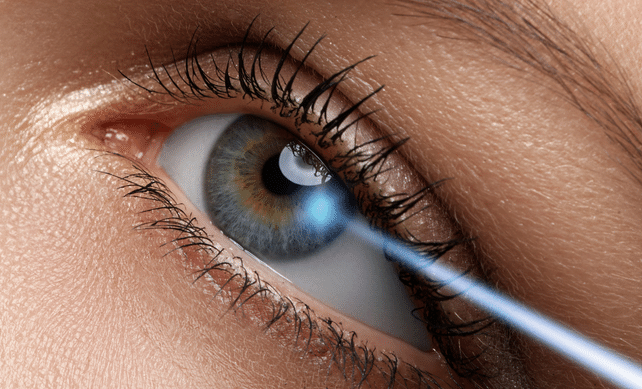Let us call you!
By clicking this button, I agree to Healthyist’s Terms of Service.
Let us call you!
By clicking this button, I agree to Healthyist’s Terms of Service.
Laser Eye Surgery
What is Laser Eye Surgery?
Laser eye surgical operation refers to a group of methods that correct imaginative and prescient. They use laser technology to reshape the cornea and accurate refractive errors, including;
- Imaginative and prescient loss
- Myopia (nearsightedness)
- Hyperopia (farsightedness)
- Astigmatism
Laser eye surgical operation ambitions to lessen or put off the want for eye drops, glasses, or touch lenses and enhance your vision.

Types of Laser Eye Surgery
There are numerous kinds of eye surgical operation, with the most common being:
- LASIK (Laser-Assisted in Situ Keratomileusis): LASIK eye surgical procedure is the most well-known and widely executed laser eye surgical operation. The surgical operation includes creating a skinny corneal flap, lifting it, after which the usage of an excimer laser to reshape the cornea. The flap is then repositioned, adhering clearly to the underlying corneal tissue.
- PRK (Photorefractive Keratectomy): PRK is an older manner that predates lasik. In preference to creating a corneal flap, the cornea’s outer layer (epithelium) is eliminated. Then an excimer laser is used to reshape the underlying corneal tissue. The epithelium renews over time, generally inside a week. Prk has a more extended recuperation length compared to lasik. However, it can be appropriate for patients with skinny corneas or different specific conditions.
- LASEK (Laser Assisted Subepithelial Keratectomy): LASEK is a mixture of lasik and prk. On this system, the epithelium is partly lifted the usage of an alcohol solution, growing a skinny flap. Then, an excimer laser is used to reshape the underlying corneal tissue. Later on, the epithelial flap is repositioned, and a bandage touch lens is carried out to useful resource restoration. Lasek may be advocated for patients with skinny corneas or unsuitable candidates for lasik.
- SMILE (Small Incision Lenticule Extraction): SMILE is a greater recent refractive surgical procedure approach. It uses a femtosecond laser to create a small, lens-formed piece of tissue in the cornea. This tissue, called a lenticule, is then removed via a small incision, which reshapes the cornea and corrects the refractive errors.
SMILE is less invasive than LASIK, because it does now not require the advent of a corneal flap. It is in particular used to treat myopia and astigmatism. Each laser eye surgery procedure has its particular benefits, recuperation times, and suitableness for specific refractive errors or corneal conditions. It's far vital to talk over with an experienced ophthalmologist or eye physician. So they decide the maximum appropriate laser eye surgical procedure method to your person needs and preferred effects.
Who is Suitable for Laser Eye Surgery?
- Age requirement: Candidates should be at least 18 years antique. Ideally, the patient have to be 21 or older to ensure their eyesight has reached stability.
- Vision stability: A affected person’s prescription should remain unchanged for at least 12 months before surgical treatment. That is due to the fact variations in imaginative and prescient can impact the system’s achievement. Applicants have to have precise visual fitness. This consists of healthful eyes and being loose from situations like glaucoma, cataracts, severe dry eye syndrome, or corneal diseases. These conditions may compromise the results of the surgical procedure.
- Overall health: Keeping properly fashionable health is vital. Specific scientific conditions, which includes autoimmune sicknesses, diabetes, or immunodeficiency issues, can avert the recovery system.
- Practical expectations: Candidates need to thoroughly recognize capability results, facet effects, and risks related to laser eye surgical operation. They should have reasonable expectations regarding the consequences.
Consulting with a professional eye doctor or eye healthcare professional is crucial. In the session, the health care professional determines if you are the correct candidate for laser eye surgery. They may meticulously verify your eyes and clinical history to decide your suitability for the method.
What is the cost of laser eye surgery?
The cost of laser eye surgical procedure varies relying on the sort of method and the location. In the United States of America, the common value of LASIK surgical operation is round $2,000 to 3,000 according to eye.
Who should not have laser eye surgery?
No longer everybody is a great candidate for laser eye surgical operation. Humans who've certain eye situations, inclusive of glaucoma or cataracts, or who have sure clinical situations, together with autoimmune diseases, might not be eligible for the system. It's far critical to visit an ophthalmologist or eye surgeon to determine if laser eye surgery is appropriate for you.
Does laser eye surgery cause pain?
Laser eye surgical operation commonly does not motive ache during the manner. Patients are given numbing eye drops to reduce pain. But, some human beings can also experience moderate discomfort or a sensation of stress at some stage in the system.
What is laser eye surgery?
Laser eye surgery is a form of vision correction method that makes use of a laser to reshape the cornea, the clean, the front part of the attention. The most commonplace kinds of laser eye surgical operation are LASIK and PRK.
How does laser eye surgery work?
At some stage in lasik surgical procedure, a thin flap is created in the cornea, that is then lifted to allow the laser to reshape the corneal tissue beneath. In prk surgical procedure, the cornea’s outer layer is removed completely to permit the laser to reshape the cornea. Each processes are performed the usage of a laptop-managed laser.
How long does the effect of laser eye surgery last?
The consequences of laser eye surgical procedure are normally everlasting, but some humans might also require a follow-up system or contact-up surgical treatment to keep ultimate vision.
Is laser eye surgery safe?
Laser eye surgery is typically considered secure, but as with every surgical treatment, there are a few dangers and capability headaches. These can include dry eye, infection, imaginative and prescient modifications, and troubles with night time vision.
What does laser eye surgery do?
Laser eye surgical operation can correct a number vision troubles, inclusive of nearsightedness, farsightedness, and astigmatism. The manner can improve usual visible acuity and decrease the want for glasses or touch lenses.
Can laser eye surgery fix astigmatism?
Yes, laser eye surgery can correct astigmatism. The procedure can reshape the cornea to accurate the abnormal curvature that causes astigmatism.
How long does laser eye surgery take?
The real manner commonly takes less than half-hour per eye, however the entire manner, consisting of coaching and healing time, may additionally take numerous hours.

